TD Magazine Article
Member Benefit
Skills > Passion
Content
A review of So Good They Can’t Ignore You: Why Skills Trump Passion in the Quest for Work You Love by Cal Newport
A review of So Good They Can’t Ignore You: Why Skills Trump Passion in the Quest for Work You Love by Cal Newport
Fri Feb 08 2013
Content
So Good They Can't Ignore You: Why Skills Trump Passion in the Quest for Work You Love
So Good They Can't Ignore You: Why Skills Trump Passion in the Quest for Work You Love
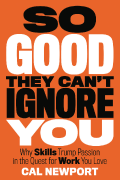
Content
By Cal Newport
By Cal Newport
Content
(Business Plus, 304 pp., $25.99)
(Business Plus, 304 pp., $25.99)
Content
What's the best way to find work that you enjoy and do well? Should you follow your hopes and dreams, or choose a job in which you know you will excel? According to Cal Newport, skills matter and adhering to the old adage "follow your passion" may be a recipe for disaster.
What's the best way to find work that you enjoy and do well? Should you follow your hopes and dreams, or choose a job in which you know you will excel? According to Cal Newport, skills matter and adhering to the old adage "follow your passion" may be a recipe for disaster.
Content
In So Good They Can't Ignore You, Newport makes the case that conventional wisdom has been wrong all along—the average person should not quit his job to pursue work that fuels his passions. Instead, the book encourages readers to be craftsmen at whatever jobs they have by developing excellence at a particular skill set and becoming indispensable to their employers.
In So Good They Can't Ignore You, Newport makes the case that conventional wisdom has been wrong all along—the average person should not quit his job to pursue work that fuels his passions. Instead, the book encourages readers to be craftsmen at whatever jobs they have by developing excellence at a particular skill set and becoming indispensable to their employers.
Content
The author identifies real-world examples of individuals who have traveled down the "passion road" only to wind up at a dead end. He includes research and anecdotal evidence that shows why people should consider following their passions only after they have honed their skills. Newport calls this "career capital"—charting your own path in life. His focus on deliberate practice, valuable skills development, and stretch learning concepts will resonate with learning and development professionals.
The author identifies real-world examples of individuals who have traveled down the "passion road" only to wind up at a dead end. He includes research and anecdotal evidence that shows why people should consider following their passions only after they have honed their skills. Newport calls this "career capital"—charting your own path in life. His focus on deliberate practice, valuable skills development, and stretch learning concepts will resonate with learning and development professionals.
Content
The book effectively provides step-by-step instructions to help readers discard conventional wisdom and build career capital. Each chapter contains a summary of previous chapters to reinforce lessons learned throughout the book. I was especially impressed with how the author wove research, stories, and encouragement together to create an even more compelling case.
The book effectively provides step-by-step instructions to help readers discard conventional wisdom and build career capital. Each chapter contains a summary of previous chapters to reinforce lessons learned throughout the book. I was especially impressed with how the author wove research, stories, and encouragement together to create an even more compelling case.
Content
The book seems to be geared toward younger readers and individuals who are dissatisfied with their current career situations. Although Newport is a leader in the information technology field, I thought it was slightly ironic that someone so young (he is 31 years old) could give firsthand advice on how to chart a worthwhile career course.
The book seems to be geared toward younger readers and individuals who are dissatisfied with their current career situations. Although Newport is a leader in the information technology field, I thought it was slightly ironic that someone so young (he is 31 years old) could give firsthand advice on how to chart a worthwhile career course.
Content
Newport describes some powerful examples of people who have chosen skills before passion, but the book could benefit from accounts of individuals from a variety of generations and different walks of life.
Newport describes some powerful examples of people who have chosen skills before passion, but the book could benefit from accounts of individuals from a variety of generations and different walks of life.
Content
It's no secret that everyone wants to do something that they love on a daily basis. And there's certainly no shortage of folks who dread their daily routines. But Newport begs readers to avoid spontaneously following their passions. Instead, he says to sharpen your skills and make connections—and only then will you experience success.
It's no secret that everyone wants to do something that they love on a daily basis. And there's certainly no shortage of folks who dread their daily routines. But Newport begs readers to avoid spontaneously following their passions. Instead, he says to sharpen your skills and make connections—and only then will you experience success.
Content
I give this book four cups of coffee and encourage you to check it out.
I give this book four cups of coffee and encourage you to check it out.
Content
Great Jobs for Everyone 50+: Finding Work That Keeps You Happy and Healthy ... and Pays the Bills
Great Jobs for Everyone 50+: Finding Work That Keeps You Happy and Healthy ... and Pays the Bills
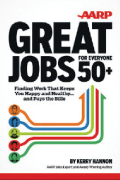
Content
Kerry Hannon
Kerry Hannon
Content
Wiley, 295 pp., $18.95
Wiley, 295 pp., $18.95
Content
Between 2010 and 2020, the federal government projects that those 55 and older will be the fastest growing segment of the U.S. workforce. "The vision of people 50+ spending their retirement years gardening, golfing, and lounging on the beach is out. Meaningful work is in," writes Hannon, AARP's job expert. To reflect this group's general interest in reduced hours, the first part of the book outlines several options for part-time jobs, including seasonal, holiday, work-from-home, and not-for-profit work. Part two offers advice for older workers conducting a job search and tips for would-be entrepreneurs. Also included are specific resources for workers age 50 and older, and profiles of successful older workers.
Between 2010 and 2020, the federal government projects that those 55 and older will be the fastest growing segment of the U.S. workforce. "The vision of people 50+ spending their retirement years gardening, golfing, and lounging on the beach is out. Meaningful work is in," writes Hannon, AARP's job expert. To reflect this group's general interest in reduced hours, the first part of the book outlines several options for part-time jobs, including seasonal, holiday, work-from-home, and not-for-profit work. Part two offers advice for older workers conducting a job search and tips for would-be entrepreneurs. Also included are specific resources for workers age 50 and older, and profiles of successful older workers.
Content
Think Like a Futurist: Know What Changes, What Doesn't, and What's Next
Think Like a Futurist: Know What Changes, What Doesn't, and What's Next
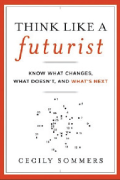
Content
Cecily Sommers
Cecily Sommers
Content
Jossey-Bass, 272 pp., $27.95
Jossey-Bass, 272 pp., $27.95
Content
You can't predict the future, but this book can help you to prepare for it. Sommers, founder of the Push Institute, a not-for-profit think tank that tracks significant global trends, has designed a strategy to plan for the future in an ever-changing world. Sommers believes that four predictable forces will influence the future: resources, technology, demographics, and governance. Her book helps readers to understand how these factors will affect them in the coming years and how to create future-oriented activities to spur innovation and creativity. Think Like a Futurist is a good read for those struggling to move their organizations forward.
You can't predict the future, but this book can help you to prepare for it. Sommers, founder of the Push Institute, a not-for-profit think tank that tracks significant global trends, has designed a strategy to plan for the future in an ever-changing world. Sommers believes that four predictable forces will influence the future: resources, technology, demographics, and governance. Her book helps readers to understand how these factors will affect them in the coming years and how to create future-oriented activities to spur innovation and creativity. Think Like a Futurist is a good read for those struggling to move their organizations forward.
Content
Mastering Presentations: Be the Undisputed Expert when You Deliver Presentations (Even If You Feel Like You're Going to Throw Up)
Mastering Presentations: Be the Undisputed Expert when You Deliver Presentations (Even If You Feel Like You're Going to Throw Up)
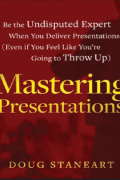
Content
Doug Staneart
Doug Staneart
Content
Wiley, 155 pp., $19.95
Wiley, 155 pp., $19.95
Content
Staneart writes Mastering Presentations for anyone who gets nervous before or during a presentation. He provides a four-step plan for giving presentations that helps to eliminate anxiety and increase self-confidence. This book offers practical presentation tips such as 10 speaking venues that can generate more clients and credibility, exercises to improve memory and assurance, and a simple but powerful process for designing a presentation in 15 minutes or less. Public speaking opportunities can develop business relationships and foster brand awareness— Mastering Presentations is vital for professionals who want to build these skills and represent their companies well.
Staneart writes Mastering Presentations for anyone who gets nervous before or during a presentation. He provides a four-step plan for giving presentations that helps to eliminate anxiety and increase self-confidence. This book offers practical presentation tips such as 10 speaking venues that can generate more clients and credibility, exercises to improve memory and assurance, and a simple but powerful process for designing a presentation in 15 minutes or less. Public speaking opportunities can develop business relationships and foster brand awareness—Mastering Presentations is vital for professionals who want to build these skills and represent their companies well.
Content
What's on John Coné's bookshelf?
What's on John Coné's bookshelf?
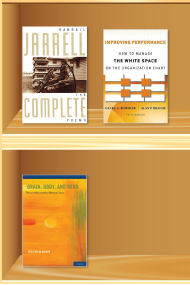
Content
The Complete Poems by Randall Jarrell. Reading Jarrell's Pictures from an Institution when I was a boy caused me to question my assumptions about how education should happen. His poetry, I think, defies classification. But it reminds me when I read it that very deep and complex opportunities for learning can be delivered in just a few minutes.
The Complete Poems by Randall Jarrell. Reading Jarrell's Pictures from an Institution when I was a boy caused me to question my assumptions about how education should happen. His poetry, I think, defies classification. But it reminds me when I read it that very deep and complex opportunities for learning can be delivered in just a few minutes.
Content
Improving Performance: How to Manage the White Space in the Organization Chart by Geary Rummler and Alan Brache. Geary was a friend and a huge influence on me professionally. By the time this book was published in 1995, I had lived through every part of it as he helped us at Motorola University. What's in it is fundamental, and I draw on it constantly.
Improving Performance: How to Manage the White Space in the Organization Chart by Geary Rummler and Alan Brache. Geary was a friend and a huge influence on me professionally. By the time this book was published in 1995, I had lived through every part of it as he helped us at Motorola University. What's in it is fundamental, and I draw on it constantly.
Content
Brain, Body, and Mind: Neuroethics with a Human Face by Walter Glannon. This title is at the front of my virtual shelf and a new one to me. While the discussions of brain-imaging research and restorative neurosurgery are a bit beyond me, I'm enjoying thinking more deeply about the ethical implications of neuropharmacology, neural implants, and emerging approaches to enhancing the capabilities of our brains.
Brain, Body, and Mind: Neuroethics with a Human Face by Walter Glannon. This title is at the front of my virtual shelf and a new one to me. While the discussions of brain-imaging research and restorative neurosurgery are a bit beyond me, I'm enjoying thinking more deeply about the ethical implications of neuropharmacology, neural implants, and emerging approaches to enhancing the capabilities of our brains.
Content
Think about it. Today elite athletes take drugs that they know will injure or even kill them in the future to achieve success today. What will junior executives, day-traders, or hedge fund managers be willing to do for a mental advantage? What will it mean to future managers of learning?
Think about it. Today elite athletes take drugs that they know will injure or even kill them in the future to achieve success today. What will junior executives, day-traders, or hedge fund managers be willing to do for a mental advantage? What will it mean to future managers of learning?
